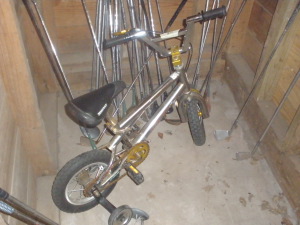
Like you, I hate writing a random letter any corporation is going to ignore. It makes me feel almost as powerless as doing nothing. But, I LOVE knowing my letter joined thousands of other letters and made a serious impact. Read all this cool stuff the CCFC has already accomplished.
From a CCFC newsletter:
Are you distressed when Batman, McDonalds, and Lego partner to sell kids on fast food and video games? When Nickelodeon features the Bratz in a made-for-TV movie? When Elmo and Barbie morph into a "Barbie loves Elmo" toy?
Are you appalled when marketers spend billions of dollars advertising toxic brands and products directly to children - and then lay all of the blame on parents for the rise of marketing-related problems like childhood obesity, youth violence, and precocious, irresponsible sexuality?
Why not do something about it? Support the Campaign for a Commercial-Free Childhood, the only national organization devoted solely to countering the harmful effects of commercialization on children. With your help, we're making a difference. We rely on you because we will not compromise our commitment to children and families by accepting corporate funding.
We act on your marketing concerns. When a Boston father contacted us because Webkinz World, the leading social network site for young children, was accepting outside ads, we alerted the media and launched a letter-writing campaign. As a result, Webkinz now gives parents the option for kids to use an ad-free version of their site.
When a mom in Seminole County, Florida, alerted us to McDonald's report card advertising at her daughter's school, we made the ads a national embarrassment for the fast food giant. Our campaign for commercial-free report cards was featured on Good Morning America, The Colbert Report, and hundreds of newspapers around the country. As a result, McDonald's agreed to end the program.
We're reclaiming schools from corporate marketers. Schools around the country are are promoting reading and not consumerism with CCFC's Guide to Commercial-Free Book Fairs. With our help, legislators and educators have made South Carolina the first state to ban all marketing on school buses. Working with local activists and parents, we've successfully stopped BusRadio - a company that plans on "taking student targeted marketing to the next level" - in school districts from Connecticut to California.
We're countering the sexualization of children. After more than 5,000 emails from CCFC members, Scholastic, Inc. decided not to bring the highly sexualized Bratz brand back to school this year. When we caught BusRadio advertising 90210 - a television show chock full of teen sex and drinking - on its website for children as young as six, they began pulling the ads within hours. Our campaign to stop Children's Hospital in Columbus from selling naming rights to the infamous Abercrombie & Fitch for $10 million launched a national conversation about the ethics of public health institutions partnering with corporations that undermine children's wellbeing.
Help us stop the commercialization of childhood, advocate for policies that protect children from unscrupulous marketers, and take on the worst corporate offenders. Your tax-deductible contribution will allow us to continue to build a coalition of organizations and individuals who value children more than the bottom line.
Thanks to an anonymous donor, every contribution of $125 or more will be doubled from now until January 1st. Any amount you are able to give would be greatly appreciated. Please visit to support CCFC today.
$500,000,000,000: The amount of money in purchases that children under twelve influence every year.
$17,000,000,000: The amount of money spent to market to children, a staggering increase from $100 million in 1983.
$3,400,000,000: Revenue generated by the Disney Princess brand in 2006. There are 40,000 Disney Princess items on the market today.
1,200,000,000: Toys sold with kids' meals at fast food restaurants in 2006.
20,000,000: Baby Einstein videos sold by Disney through 2006. The American Academy of Pediatrics reccomends no screen time for children under two.
200,000: The acts of violence, including 40,000 murders, that the average child will see on television by the time they are eighteen.
25,000: Ads on television the average 2-11-year-old sees on television every year, a figure that does not include product placement.
4,151: The number of product placements on the first thirty-eight episodes of American Idol.










































